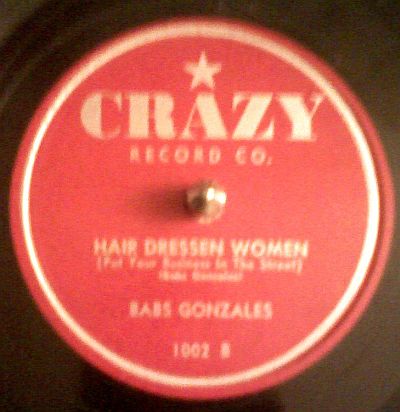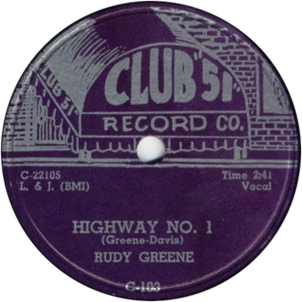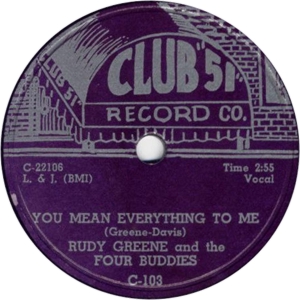Every record collector has their magic moments when the holy grail appears, and one of those magic moments happened this weekend. Actually two. And both were provided by my long time drug dealer fellow collector, Victor Pearlin. Victor Pearlin is *the man*. He’s been a serious, hardcore doo wop/blues/r&b collector since I was just a kid in Junior High first stumbling into this music in a serious way. Victor is one of the nicest guys you wanna meet, and every time we have a transaction, he lets me drop by his house to pick up my stuff. I love hanging out with him, even if only briefly. He’s the most knowledgeable person I know, regarding this particular set of musical genres, and I always come away with some great stories and new understanding about this music. He’s just great.
Anyway, the first is a replacement copy of Babs Gonzales’ Hair Dressen Women. I once owned a copy of this that I’d had since I was a young kid. We’re talking like kindergarten. But when I made my last move into the house I live in now, the record mysteriously vanished. I have no idea who would be interested in it. But it literally vanished without a trace. It’s a hard record to come by on 78. Click on the image below to hear it.
Gonzales was quite a figure in his day, being among the first to popularize scat and vocalese – jazz vocal techniques where the voice generated wordless nonsensical sounds to function as musical notes alongside traditional instruments. When the bop fad was fading out, he became quite a cult figure and hipster, resulting in some very entertaining records – see also his “Bebop Santa Clause” track in my Christmas On The Rocks jukebox page.
——————
The second moment was his revelation that he had a record for sale from the highly elusive Club 51 imprint. Club 51 was a tiny R&B label in Chicago, operated out of the back room of Chicago’s noted Savoy Record Mart. Over the two years of its existence, Club 51 released only 8 records, all in very small quantities, and all prized by collectors. Relic Records in its Golden Groups series released an incomplete anthology of the label in the 1970s, only focusing on the doo wop tracks and excluding all the blues and jazz output of the label. But guess who has a deal worked with a British imprint to anthologize the entire label output, and who is using his pristine collection as the source material? You guessed it, our man Victor. Watch for an announcement of the CD release in this space sometime in October. Yes, I’m very excited. Anyway, I’ve dreamed about owning one of these incredibly rare and legendary records for decades. Click on the images below to hear the two tracks from the record. Info about the label and this specific record are below. This is a rare treat; these records *never* show up.
Club 51, which existed from 1955 to 1957, was one of the myriad mom and pop labels that briefly made their appearance in Chicago during in the post-World War II efflorescence of independent label recording activity. The label grew out of the various enthusiasms of local entrepreneur Jimmie Davis and his wife Lillian. Club 51 operated as part of the Davises’ Savoy Record Mart at 527 East 63rd Street.
All of the information about the recording sessions resulting in all of the sides released by Club 51 has long since disappeared, if there was ever any real record of it at all. Hence, the only historical data about these records is the records themselves and anecdotal information collected from informal interviews conducted with surviving artists over the last 40 years.
Personnel on this record was: Rudy Greene (vocal) with The “Four” Buddies: Ularsee Manor, Jimmy Hawkins, Irving Hunter, William Bryant, Dickie Umbra (voc on You Mean Everything To me only); accompanied by Eddie Chamblee Combo.
Some time in early 1955, Jimmie Davis brought into Universal Studios the blues man Rudy Greene, R&B singer Bobbie James, and the Five Buddies. Jimmie Davis told Dick Reicheg that he used Eddie Chamblee’s group on this session. Ularsee Manor confirms that Chamblee was on tenor sax and adds that Prince Cooper was the pianist: “Cooper was like the house band.”
Edwin Leon Chamblee was born in Atlanta, Georgia, on February 24, 1920. He attended Wendell Phillips High in Chicago, where he was a classmate of Ruth Jones (better known to posterity as Dinah Washington). From 1941 to early 1946 he worked as musician in Army bands. Returning to Chicago, he began an association with the Miracle label. Initially he appeared as a sideman on sessions with Dick Davis and Sonny Thompson, but after the tremendous success of Thompson’s “Long Gone” (a two-sided blues instrumental featuring Chamblee’s solo on Part II), he began recording for Miracle Records as a leader, scoring a hit with “Back Street” in 1949. He stayed with Miracle until it folded in 1950, then cut two more sessions for its successor label, Premium. In 1952, Chamblee did one session for Coral (a Decca subsidiary), then began an association with the United label that lasted until the end of 1954. While at United, he backed the extremely popular Four Blazes in the studio, accompanied the vocal group The Five Cs, and cut three sessions of what was picturesquely billed as “The Rockin’ and Walkin’ Rhythm of Eddie Chamblee.”
After his work for Club 51, he went on the road with Lionel Hampton’s big band in 1955-1956. In 1957 and 1958 he worked with singer Dinah Washington (he was briefly Dinah’s fifth husband; the relationship came to a end when she made her point in a quarrel by smashing his saxophone against a barroom wall). He recorded two jazz LPs in Chicago for EmArcy in 1957 and 1958, on Dinah Washington’s recommendation (she was a Mercury artist); he also accompanied her on many of her own sessions. After splitting with Dinah Washington, he enjoyed a run of several months at McKie’s Disc Jockey Lounge in 1958. Subsequently Chamblee moved to New York, where he led a series of jazz combos. He made an LP for Prestige with an organ trio (1964) and a reunion album with other Lionel Hampton alumni for the French label Black & White (1976). In the mid to late 1980s he led a quartet that played the Saturday afternoon “jazz brunch” at Sweet Basil in New York City. He died May 1, 1999 in a New York nursing home.
Rudolph Spencer Greene (often spelled “Green”) was a blues guitarist and singer who had first recorded for the Bullet label in Nashville in 1947, and then done two sessions as a leader for Chance Records in 1952 – 1953. He also made as a sideman appearance behind singer Bobby Prince for RCA Victor in 1953. Greene was a disciple of T. Bone Walker–one of the two photos we have seen of him shows him playing the guitar behind his head, a stunt for which his idol was well known–and many of the fine guitar solos in his recorded work show that fluid approach. Greene was continuously employed in the Chicago area clubs during 1954 and the first half of 1955. As late as January 1955 he was still being billed as a Chance recording star, while performing at Club 34 (3417 Roosevelt Road). After a couple of weeks at the Crown Propeller Lounge, he returned to Club 34, which declared in early April that he was “back from a recording tour.” The tour hadn’t taken him any farther than Universal Recording, but no matter.



